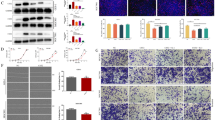Abstract
Objective
We investigated the effects of exogenous AP-2α gene on SW620 cell cycle, apoptosis and proliferation.
Methods
The Plasmid pcDNA3.1(+)-AP-2α was transfected into colorectal carcinoma SW620 cells line by liposome mediation for transient expression. After AP-2α transfected SW620 cells, the exogenous AP-2α mRNA and protein express were determined by the method of Real-time PCR and Western blot. In order to elucidate the effect of expression of exogenous AP-2α gene on the colorectal cancer cell SW620, the proliferation rates were analyzed by growth curves for cells including SW620, pcDNA3.1(+)/SW620 and pcDNA3.1(+)-AP-2α/SW620. At same time, the apoptotic rate of cells and the cell cycle analysis were also tested by flow cytometry.
Results
The mRNA and protein expressions of AP-2α gene could be enhanced by transfecting of pcDNA3.1(+)-AP-2α recombinant plasmid into SW620 cell. The cell growth rates of SW620 cells transfected with pcDNA3.1(+)/AP-2α were slower than those transfected with pcDNA3.1(+) or untransfected. The apoptotic rates were increased compared with pcDNA3.1(+)/SW620 and SW620 (P < 0.05), which indicated that over-expression of AP-2α gene could efficiently inhibit the growth of SW620 cells and induce apoptosis. FCM analyses indicated that the cells being arrested in G1 phase.
Conclusion
AP-2α gene can be efficiently transfected into SW620 cells and over-expression AP-2α protein in the transfected cells. AP-2α induces G1 arrest and apoptosis, suppressive effect on cell growth.
Similar content being viewed by others
References
Hilger-Eversheim K, Moser M, Schorle H, et al. Regulatory roles of AP-2 transcription factors in vertebrate development, apoptosis and cell-cycle control. Gene, 2000, 260: 1–12.
Wajapeyee N, Somasundaram K. Cell cycle arrest and apoptosis induction by activator protein 2alpha (AP-2alpha) and the role of p53 and p21WAF1/CIP1 in AP-2alpha-mediated growth inhibition. J Biol Chem, 2003, 278: 52093–52101.
Zhang X, Leung YK, Ho SM. AP-2 regulates the transcription of estrogen receptor (ER)-beta by acting through a methylation hotspot of the 0N promoter in prostate cancer cells. Oncogene, 2007, 26: 7346–7354.
Zhang J, Hagopian-Donaldson S, Serbedzija G, et al. Neural tube, skeletal and body wall defects in mice lacking transcription factor AP-2. Nature, 1996, 381: 238–241.
Kannan P, Buettner R, Chiao PJ, et al. N-ras oncogene causes AP-2 transcriptional self-interference, which leads to transformation. Genes Dev, 1994, 8: 1258–1269.
Zeng YX, Somasundaram K, el-Deiry WS. AP2 inhibits cancer cell growth and activates p21WAF1/CIP1 expression. Nat Genet, 1997, 15: 78–82.
Tummala R, Romano RA, Fuchs E, et al. Molecular cloning and characterization of AP-2 epsilon, a fifth member of the AP-2 family. Gene, 2003, 321: 93–102.
Moser M, Pscherer A, Roth C, et al. Enhanced apoptotic cell death of renal epithelial cells in mice lacking transcription factor AP-2beta. Genes Dev, 1997, 11: 1938–1948.
Gee JM, Robertson JF, Ellis IO, et al. Immunohistochemical analysis reveals a tumour suppressor-like role for the transcription factor AP-2 in invasive breast cancer. J Pathol, 1999, 189: 514–520.
Ropponen KM, Kellokoski JK, Pirinen RT, et al. Expression of transcription factor AP-2 in colorectal adenomas and adenocarcinomas; comparison of immunohistochemistry and in situ hybridisation. J Clin Pathol, 2001, 54: 533–538.
Ruiz M, Pettaway C, Song R, et al. Activator protein 2alpha inhibits tumorigenicity and represses vascular endothelial growth factor transcription in prostate cancer cells. Cancer Res, 2004, 64: 631–638.
Karjalainen JM, Kellokoski JK, Eskelinen MJ, et al. Downregulation of transcription factor AP-2 predicts poor survival in stage I cutaneous malignant melanoma. J Clin Oncol, 1998, 16: 3584–3591.
Jean D, Gershenwald JE, Huang S, et al. Loss of AP-2 results in up-regulation of MCAM/MUC18 and an increase in tumor growth and metastasis of human melanoma cells. J Biol Chem, 1998, 273: 16501–16508.
Huang Z, Xu H, Sandell L. Negative regulation of chondrocyte differentiation by transcription factor AP-2alpha. J Bone Miner Res, 2004, 19: 245–255.
Pellikainen JM, Kosma VM. Activator protein-2 in carcinogenesis with a special reference to breast cancer — a mini review. Int J Cancer, 2007, 120: 2061–2067.
Bar-Eli M. Gene regulation in melanoma progression by the AP-2 transcription factor. Pigment Cell Res, 2001, 14: 78–85.
Marreiros A, Dudgeon K, Dao V, et al. KAI1 promoter activity is dependent on p53, junB and AP2: evidence for a possible mechanism underlying loss of KAI1 expression in cancer cells. Oncogene, 2005, 24: 637–649.
Mitchell DC, Abdelrahim M, Weng J, et al. Regulation of KiSS-1 metastasis suppressor gene expression in breast cancer cells by direct interaction of transcription factors activator protein-2alpha and specificity protein-1. J Biol Chem, 2006, 281: 51–58.
Bar-Eli M. Molecular mechanisms of melanoma metastasis. J Cell Physiol, 1997, 173: 275–278.
Author information
Authors and Affiliations
Corresponding author
Rights and permissions
About this article
Cite this article
Du, Y., Xu, L., Miao, J. et al. AP-2α gene transfection effects cell proliferation and cell apoptosis of SW620 cells line in colorectal carcinoma. Chin. -Ger. J. Clin. Oncol. 9, 221–225 (2010). https://doi.org/10.1007/s10330-010-0007-9
Received:
Revised:
Accepted:
Published:
Issue Date:
DOI: https://doi.org/10.1007/s10330-010-0007-9




